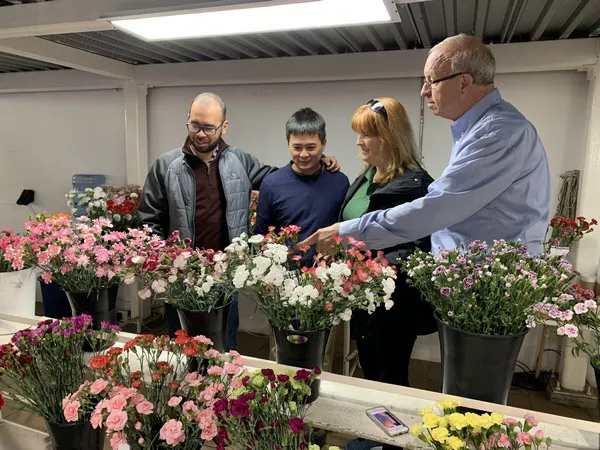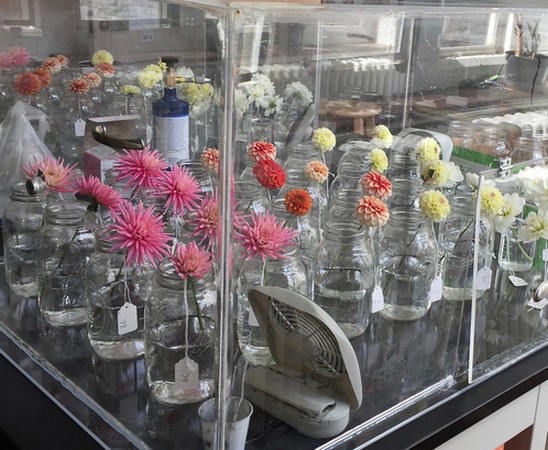“Our research continues to solve industry challenges and to develop practices that produce better quality and longer lasting flowers and plants industry wide.” As American Floral Endowment (AFE) is celebrating their 60th anniversary, Debi Chedester, Executive Director, shares the importance of funding floriculture research and scholarships, as well as the recent challenge of losing researchers. AFE programs are funded through industry contributions. To support the floriculture industry AFE is currently organizing an anniversary funding campaign, where they are raising $60,000 in 60 days. “With these contributions we can increase our annual funding for more research and provide more scholarships and programs for the industry.” 
From left to right: two AFE funded researchers, AFE Executive Director Debi Chedester, and Dr. Terril Nell, AFE’s Research Coordinator.
The importance of floriculture research
According to Chedester, AFE’s work has been important as floriculture is a highly specialized industry with a large number of specialty crops. “In floriculture there are many different crops to deal with, including potted plants, bedding plants, perennials and cut flowers. Production and handling practices are often unique to the crop, thus influencing aspects such as the temperature, light, water, fertilizer, pest management and postharvest handling. It is important to have as much knowledge as possible to optimize cultivation of each specific crop. Having an organization like AFE identifying and funding expert researchers specialized in physiology, entomology, pathology, and other fields helps provide industry-wide guidelines and standards for successful production and care.”
Dahlia research
Customers influence research area
Chedester explains that AFE’s research is industry-driven, allowing them to consistently address the most important needs as they change. Yet an important aspect to always keep in mind, is the consumer. “If consumers don’t have a great experience with flowers and plants, they won’t continue to purchase them.” For example, as floral customers expect the products to be at the optimum state of development and blemish free, pest management and postharvest handling are primary and critical research areas. “Most recently AFE established a special Thrips and Botrytis Research Fund raising $1.5 million to tackle these pests and disease issues. Eight projects are currently being funded with early results being released later this month in a series of webinars.” AFE is also focusing more and more on sustainability as a research area, as this is becoming a more important aspect for customers as well as growers. “For example, we have recently been focusing on environmental management to optimize plant growth while reducing energy use, labor and use of water, fertilizer and chemicals. This will continue to be a research focus.” According to Chedester, while consumers are the end user, every segment of the industry benefits from the research AFE funds that leads to the production of high quality and long-lasting plants.
Scholarships as a solution to labor challenges
AFE awards over 30 scholarships annually, leading to a contribution of about $160,000 a year in scholarships. “Labor continues to be a challenge, not just in production but in all areas of the industry. If we want to attract top talent, we need to support and foster that talent and provide opportunities to them through scholarships and hands-on internship programs. The financial burden of students is real, and if we expect to compete with other industries for top talent, providing financial assistance and opportunities is critical. Without the funding that AFE provides through scholarships and internships, we could be faced with an even greater shortage of professionals.”
Losing researchers
According to Chedester, one of the biggest challenges for AFE is that the number of researchers in floriculture has been declining over the years. “Therefore, AFE has been proactive in looking to other industries conducting similar research to bring their expertise to floriculture. We are a firm believer in supporting University research programs, especially as Universities reduce budgets, and as floriculture departments sometimes become part of a bigger agriculture department. If this continues to happen, we are losing the specialized expertise. Without specialized floriculture programs, we lose floriculture researchers, faculty and the next generation of industry leaders.”
$60,000 in 60 days
“As we celebrate our 60th Anniversary, we invite everyone to join our fundraising campaign. We are raising $60,000 in 60 days, which runs until August 13, 2021. Contributions make things happen and as we focus on growing our funding pool, we can increase our annual funding for more research and provide more scholarships and programs for the industry.” To donate or become a sponsor, go to www.endowment.org/60days.
For more information:
American Floral Endowment![]()
Debi Chedester
dchedester@afeendowment.org
www.endowment.org
